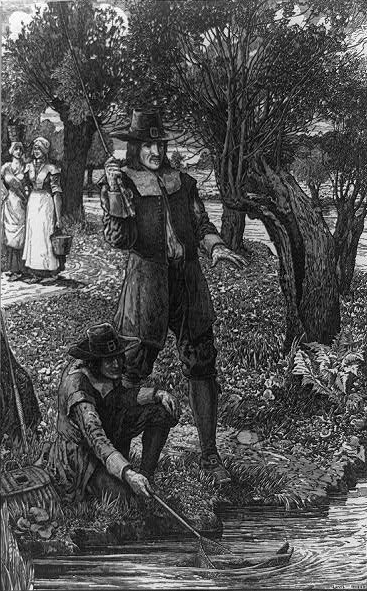 |
| "Izaak Walton and his scholar" (1900) |
| by Louis John Rhead. |
The verb angle derives from the Old English verb angelen and the noun angel, which refers to an angle or hook, and was related to the word anga, meaning hook, from the Proto-Indo-European base *ang-/*ank-, which means to bend. Similar words include angul from Old English, öngull from Old Norse, and angul from Old High German. In case you're wondering, Old English angel has absolutely no relation to messengers from the divine. The modern English angel is a fusion of the Old English engel and the Old French angele. Both words derived from the Latin angelus and Greek angelos. So the fishy part of angle is all a matter of the hook, that piece of metal that has been bent to form an angle, although modern fishhooks are more of a smooth curve with a barb. I suppose you could argue that the barb forms an angle.
Angling has long been a passion of many. One of the most famous books on the subject is Izaak Walton's The Compleat Angler, first published in 1653. Walton (1593-1683) added to the book throughout his life and published several later editions during the next quarter century. In prose and verse, Walton and a few contributors extol the art and spirit of angling. Others find little to celebrate in angling and consider it a waste of time. John Palsgrave (c. 1485 – 1554), a priest in Henry VIII's court and tutor in the royal household, wrote: "It is but a sory lyfe and an yuell to stand anglynge all day to catche a fewe fisshes."
Fascinating! I love etymology. It's also always amused me that Britain was invaded by the Angles in the 5th century or so. I have this vision of all these acute and obtuse angles arriving from the sea...
ReplyDeleteHa ha. That's too funny, Simon. It must have been terrifying!
DeleteI was already familiar with the word and the book, but I enjoyed reading this expansion of the definition to include the etymology. I'm a word geek, so stuff like this is always interesting. Cool post!
ReplyDeleteThanks for reading, Keanan.
Delete